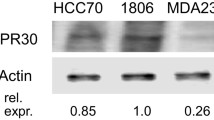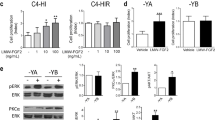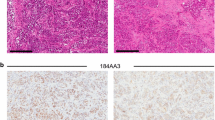Abstract
The development of antioestrogen resistance is a major clinical obstacle encountered in the treatment of breast cancer. By long-term growth in oestrogen-free medium, we have derived an oestrogen-independent, anti-oestrogen resistant cell line from the oestrogen receptor (ER)-positive, oestrogen-dependent T47D human breast cancer cell line. This cell line grows maximally in oestrogen-free medium and is resistant to all tested antioestrogens. This cell line does not express any measurable amounts of ER mRNA or protein and, in short-term studies, these cells show no response to either oestrogens or antioestrogens. However, return of these cells to oestrogen-containing medium for more than 8 weeks resulted in the re-expression of ER mRNA and protein. Subsequent limiting dilution subcloning of the T47D:C4 line revealed two phenotypically distinct clones, one which did not express measurable ER after long-term growth in oestrogen-containing medium and one which expressed ER mRNA and protein after a number of weeks in oestrogen-containing medium. In the absence of oestrogen, both types of cells are ER-negative as determined by Northern and Western blotting and lack of any oestrogen-dependent responses. The clone which re-expresses the ER (T47D:C4:5W) now responds to E2 with a 50% increase in growth and a 30-fold induction of an ER-responsive luciferase reporter construct. Long-term growth of the stably ER-negative clone (T47D:C4:2W) causes no measurable oestrogen-mediated responses, as assessed by ER expression, growth stimulation or luciferase induction. Interestingly, ER mRNA can be detected in both cell types by using reverse transcriptase-polymerase chain reaction (RT-PCR). This suggests that the ER mRNA present in the T47D:C4:2W clone is either inefficiently translated or is present at such a low level as to be functionally irrelevant. These novel clonal cell lines will prove to be invaluable in the study of the regulation of ER expression and regulatory pathways leading to oestrogen-independent growth.
Similar content being viewed by others
Author information
Authors and Affiliations
Rights and permissions
About this article
Cite this article
Pink, J., Bilimoria, M., Assikis, J. et al. Irreversible loss of the oestrogen receptor in T47D breast cancer cells following prolonged oestrogen deprivation. Br J Cancer 74, 1227–1236 (1996). https://doi.org/10.1038/bjc.1996.521
Issue Date:
DOI: https://doi.org/10.1038/bjc.1996.521
- Springer Nature Limited
This article is cited by
-
Triple SILAC identified progestin-independent and dependent PRA and PRB interacting partners in breast cancer
Scientific Data (2021)
-
Turning scientific serendipity into discoveries in breast cancer research and treatment: a tale of PhD students and a 50-year roaming tamoxifen team
Breast Cancer Research and Treatment (2021)
-
Intrinsic apoptotic pathway activation increases response to anti-estrogens in luminal breast cancers
Cell Death & Disease (2018)
-
Protein kinase C α enhances migration of breast cancer cells through FOXC2-mediated repression of p120-catenin
BMC Cancer (2017)
-
Fibroblast growth factor receptor splice variants are stable markers of oncogenic transforming growth factor β1 signaling in metastatic breast cancers
Breast Cancer Research (2014)




